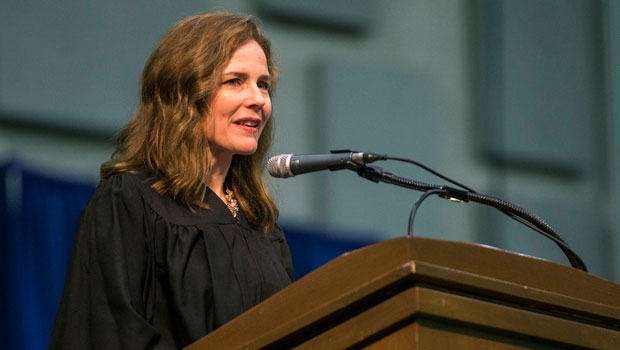Some of the dehumanizing options — which is actually a built-in element and never a bug — of the U.S. immigration system because it pertains to asylum seekers is that the applicant bears the burden of proving they’ve suffered sufficient or that they threat loss of life of their house nation as a way to be granted permission to remain. The extra horrifying the survived experiences, the higher the possibilities for a constructive end result. However how does one exactly quantify somebody’s misery or the chance that their security shall be threatened? These stipulations exist extra to maintain individuals from the growing world out than to supply them safety.
The Christian drama “Between Borders” makes use of a contentious asylum trial as a framing system to sort out the real-life case of the Petrosyan household, an ethnic Armenian couple and their two daughters, for whom Azerbaijan was the one house they’d ever recognized. Though tensions between Armenians and Azerbaijanis are longstanding, particularly over the Nagorno-Karabakh area, for many of the twentieth century, Russia maintained a semblance of order. However because the Soviet Union started to crumble, bloodshed erupted, leading to extra that 30,000 deaths and 200,000 displaced Armenians who fled Azerbaijan between 1988 and 1994.
Well timed as the subject material stays within the present political local weather — particularly since most Individuals have little clue as to how their authorities establishments deal with refugees and immigrants — the newest inspirational narrative from director Mark Freiburger (2013’s “Jimmy”), who co-wrote the screenplay with Isaac Norris and Adam Sjoberg, goals for middling influence at greatest. Proficiently crafted so far as manufacturing design and cinematography go (the units and exteriors are plausible sufficient as Jap Europe, whereas the camerawork and lighting seem unimaginatively normal), “Between Borders” runs on didactic writing that renders the Petrosyans’ plight right into a spinoff interval drama.
Rocket scientist Ivan Petrosyan (Patrick Sabongui) and his college principal spouse Violetta (Elizabeth Tabish) escape Azerbaijan after their neighbors, additionally Armenians, are killed. They finally make it to Russia, the place discrimination from each authorities and employers turns into their new actuality. It’s solely by a gaggle of native parishioners with ties to a church in West Virginia that the Petrosyans discover a sense of neighborhood. Nonetheless, outdoors of the congregation violence lurks. As Ivan and Violetta recall their trauma within the current, counselor Whitlow (Elizabeth Mitchell) harshly questions their newly discovered religion, their ties to communism, and their causes for desirous to make America their everlasting house.
The selection of constructing the movie completely in English, most likely motivated by a want for wider enchantment, hurts the inventive high quality significantly. That’s not solely due to the apparent inaccuracy of getting scenes set in Azerbaijan or Russia with characters talking in fluent English, however as a result of this contributes to the stiltedness of the performances. Tabish and Sabongui say their already platitudinous dialogue in forcibly accented English, making one hyperaware of their self-conscious, contrived performing. The kid actors enjoying their daughters (Sofia Pistireanu and Natalia Badea) are simply as openly unnatural of their supply.
Sure particulars want explaining through the courtroom sequences on account of this language element, resembling the truth that the household couldn’t discover work in Armenia as a result of, whereas they’re ethnically Armenians, they don’t communicate the language since they had been born and raised in Azerbaijan. Such situations of over-explanatory context and uninspired, ill-timed dialogue evolve into the verbose and on-the-nose speech that Ivan utters when confronting a gaggle of hooligans, or to the decide within the case (performed by Michael Paul Chan) reciting the textual content written on the Statue of Liberty earlier than asserting his verdict.
An artistically mediocre film with usually good intentions (there’s one thing to be mentioned about how spiritual teams provide support in hopes that the beneficiaries convert), “Between Borders” exists primarily as a message-dissemination car. Seemingly unconcerned with pursuing cinematic excellence, Freiburger wraps up the story in completely saccharine style and avoids partaking with the subject’s more difficult political nuances.
Will Christian viewers touched by the story of those fellow Christians in search of refuge on this nation be keen to increase comparable empathy to refugees or migrants who will not be of their similar religion, who will not be extremely educated or who will not be working from communism? It typically appears that honest believers have the power to compartmentalize their compassion and lack the self-awareness to see that their actions and ideologies go in opposition to their spiritual values. “Between Borders” gives this crowd a great narrative a few household they will get behind, however will they self-interrogate or be trustworthy about why the Petrosyans are worthy of the kindness they so simply deny others? Unlikely.
“Between Borders” will get a one-day special-event launch on Jan. 26, with extraordinarily restricted theatrical showtimes within the days instantly following.
The post A Middling Non secular Refugee Drama appeared first on Allcelbrities.









